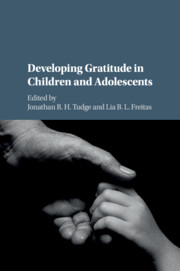Book contents
Part III - Developing Gratitude
Published online by Cambridge University Press: 07 December 2017
- Type
- Chapter
- Information
- Developing Gratitude in Children and Adolescents , pp. 175 - 282Publisher: Cambridge University PressPrint publication year: 2017



